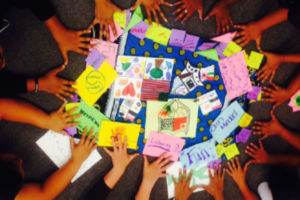A Milwaukee public Montessori school’s multi-age classrooms—and one-building K3-12 approach—is creating a unique learning community that allows older students to mentor their younger classmates.


A Milwaukee public Montessori school’s multi-age classrooms—and one-building K3-12 approach—is creating a unique learning community that allows older students to mentor their younger classmates.
MacDowell Montessori School Principal Andrea Corona told the Shepherd Express that MacDowell started in 1976 as the first public Montessori elementary school in the state. She discussed how a decision to expand to a charter high school in 2006, and merge it with the elementary school in 2012, is building a stronger learning community.
“The nice part about being a K-12 school is we have a prime opportunity for vertical alignment of our curriculum. We’re all here in the same building and we can talk,” Corona said.
“It gives you the opportunity to build community in a way that most schools don’t have. Some of the students that are graduating this year were here since they were 3 years old, and that’s really special . . . We try to build opportunities for them to be leaders and for them to showcase their skills,” she said.
Corona explained that the school is structured based on Montessori founder Maria Montessori’s focus on the three-year developmental plans, with students with the same teacher for three years to build consistency, community, and leadership skills.
“For example, in our K3 through K5 classroom, the K5s are the stewards of the environment and the community,” Conora said. “The younger students have to ask them for help and guidance. Each time students transition to a new developmental level, they get to work to become leaders again.”
The community building extends well beyond the classroom, as well.
“For example, last year, two of our varsity boys basketball players coached the elementary basketball team,” Cornoa told the Shepherd Express. “We also give older students opportunities to work as tutors with the elementary level students; and we have a Big Brothers-Big Sisters program.”
The principal said the Montessori curriculum requires students to work independently and in small groups, while encouraging them to take control of their own learning.
“For example, if I’m giving you a lesson about currents in the ocean, you may get extraordinarily interested in the science of currents, you may get interested in the doldrums and how ships used to get trapped for months, and you might start researching historical stories about how that happened. Each individual student has the opportunity to follow their interest and explore content in a way that’s most meaningful for them,” Corona said.
The approach, combined with traditional offerings like the International Bachelorette program and partnerships with local arts and science groups, is leading to impressive academic results at the small school.
“Two years ago, we were recognized for academic rigor by The Washington Post,” Corona said. “We were really pleased to be ranked number 27 in the state of Wisconsin for academic outcomes—especially considering that we graduated a class of 32 students that year, and we don’t have an admissions requirement. We just couldn’t believe it. We felt like the Little Engine that Could.”
MacDowell Montessori is a prime example of successful pedagogical schools that use strong traditions and a focused vision to guide students.
David Sikkink, a professor of sociology at the University of Notre Dame and lead researcher of pedagogical schools for the Institute for Advanced Studies in Culture’s School Cultures and Student Formation Project explains the impact on teachers and students in the book The Content of Their Character:
[O]ften teachers were viewed as custodians of the moral tradition of the school and its place in a larger movement, as journeymen in the daily playing out of the school society. Students entered not only the school doors but the larger traditions in which the school organization was given meaning and direction.
At MacDowell, students are living a tradition of developing deep content knowledge while actively mentoring younger classmates.
Skikkink’s research into character and citizenship formation in pedagogical schools is featured in the new book The Content of Their Character, available in February. The Content of Their Character, which also highlights research into nine other sectors of American high schools, is currently available for pre-order at a discount.